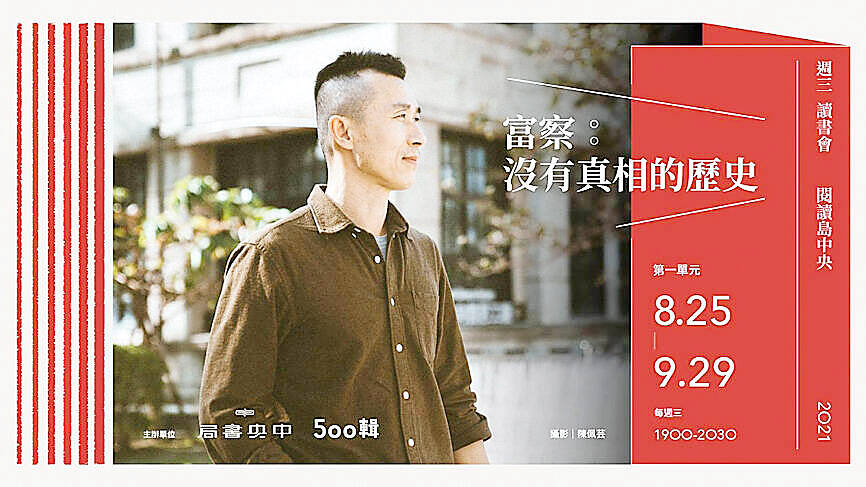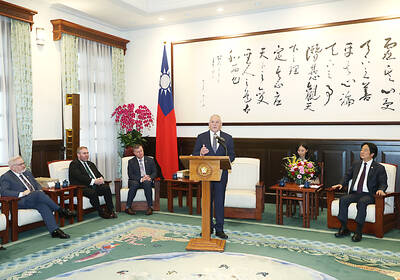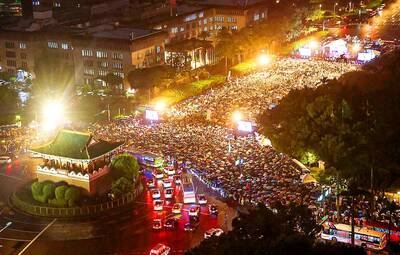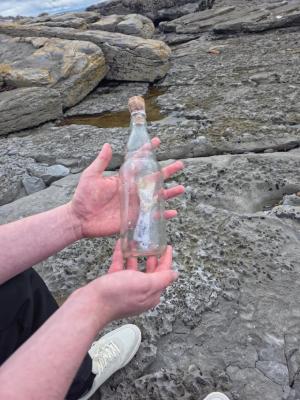Gusa Press (八旗文化) editor-in-chief Li Yanhe (李延賀) is being prosecuted in China for allegedly “endangering national security,” sources said yesterday, with a political analysist saying it was a clearly an effort to intimidate Taiwanese.
Li, better known by his pen name, Fucha (富察), was born in China’s Liaoning Province and obtained Taiwanese citizenship after living in Taiwan for many years.
He returned to Shanghai in March 2023 to cancel his household registration, but was arrested by police and has been detained in an unknown location ever since.

Photo: Screen grab from Facebook
Gusa Press has published books that are critical of China’s autocratic regime, including Tibet — 70 Years of Domination under the People’s Republic of China (新疆 — 被中共支配的七十年).
In December last year, the Straits Exchange Foundation (SEF) asked the Taipei City Government about Fucha’s release during the Shanghai-Taipei City Forum. Fucha’s family, who hope to keep the case low profile, said he should not be mentioned in public again.
On Feb. 26, the Chinese Supreme People’s Procuratorate threated to crack down on crimes related to national security and publicly declared that Fucha and Taiwanese National Party cofounder Yang Chih-yuan (楊智淵) “majorly endangered national security cases.”
Fucha was accused of “inciting secession of the country” and Yang was labeled a separatist.
China’s deputy chief prosecutor Miao Shengming (苗生明) last month said the procuratorate would severely punish all crimes that threaten national security, including Yang and Fucha’s cases.
Sources yesterday told the Chinese-language Liberty Times (sister paper of the Taipei Times) that Fucha had already been secretly prosecuted and a heavy sentence had been requested, although the court has not yet officially announced the verdict.
Yang was sentenced to nine years in prison and deprived of his civil rights for two years, they said.
Fucha and Yang were arrested and prosecuted for actions outside of China, they said, adding that people should be more careful when traveling to China.
The SEF yesterday said it has been assisting Fucha’s family and that it would continue to monitor the situation while providing support.
The Mainland Affairs Council previously said that Fucha’s case was being used by Chinese authorities as a “symbolic propaganda example.”
In other news, three Taiwanese members of the religious group I-Kuan Tao (一貫道), who were in their 70s and 80s, were arrested in China in October last year. They are still being detained, on suspicion of “organizing and practicing as members of a cult that undermines law enforcement.”
Two Taiwanese members of the Unification Church were also arrested in Xiamen for allegedly proselytizing earlier this year.
National Chengchi University Institute of International Relations Taiwan-China affairs researcher Soong Kuo-cheng (宋國誠) yesterday said that China’s failure to efficiently try and sentence Taiwanese “dissidents,” and leaving their cases hanging is a form of intimidation toward Taiwanese.
China wants the progress of the Fucha case to remain ambiguous, as that would psychologically intimidate Taiwanese, he added.
Additional reporting by CNA

‘NON-RED’: Taiwan and Ireland should work together to foster a values-driven, democratic economic system, leveraging their complementary industries, Lai said President William Lai (賴清德) yesterday expressed hopes for closer ties between Taiwan and Ireland, and that both countries could collaborate to create a values-driven, democracy-centered economic system. He made the remarks while meeting with an Irish cross-party parliamentary delegation visiting Taiwan. The delegation, led by John McGuinness, deputy speaker of the Irish house of representatives, known as the Dail, includes Irish lawmakers Malcolm Byrne, Barry Ward, Ken O’Flynn and Teresa Costello. McGuinness, who chairs the Ireland-Taiwan Parliamentary Friendship Association, is a friend of Taiwan, and under his leadership, the association’s influence has grown over the past few years, Lai said. Ireland is

FINAL COUNTDOWN: About 50,000 attended a pro-recall rally yesterday, while the KMT and the TPP plan to rally against the recall votes today Democracy activists, together with arts and education representatives, yesterday organized a motorcade, while thousands gathered on Ketagalan Boulevard in Taipei in the evening in support of tomorrow’s recall votes. Recall votes for 24 Chinese Nationalist Party (KMT) lawmakers and suspended Hsinchu City mayor Ann Kao (高虹安) are to be held tomorrow, while recall votes for seven other KMT lawmakers are scheduled for Aug. 23. The afternoon motorcade was led by the Spring Breeze Culture and Arts Foundation, the Tyzen Hsiao Foundation and the Friends of Lee Teng-hui Association, and was joined by delegates from the Taiwan Statebuilding Party and the Taiwan Solidarity

An SOS message in a bottle has been found in Ireland that is believed to have come from the Taiwanese captain of fishing vessel Yong Yu Sing No. 18 (永裕興18號), who has been missing without a trace for over four years, along with nine Indonesian crew members. The vessel, registered to Suao (蘇澳), went missing near Hawaii on Dec. 30, 2020. The ship has since been recovered, but the 10 crew members have never been found. The captain, surnamed Lee (李), is believed to have signed the note with his name. A post appeared on Reddit on Tuesday after a man

Instead of threatening tariffs on Taiwan-made chips, the US should try to reinforce cooperation with Taiwan on semiconductor development to take on challenges from the People’s Republic of China (PRC), a Taiwanese think tank said. The administration of US President Donald Trump has threatened to impose across-the-board import duties of 32 percent on Taiwan-made goods and levy a separate tariff on semiconductors, which Taiwan is hoping to avoid. The Research Institute for Democracy, Society, and Emerging Technology (DSET), a National Science and Technology Council think tank, said that US efforts should focus on containing China’s semiconductor rise rather than impairing Taiwan. “Without